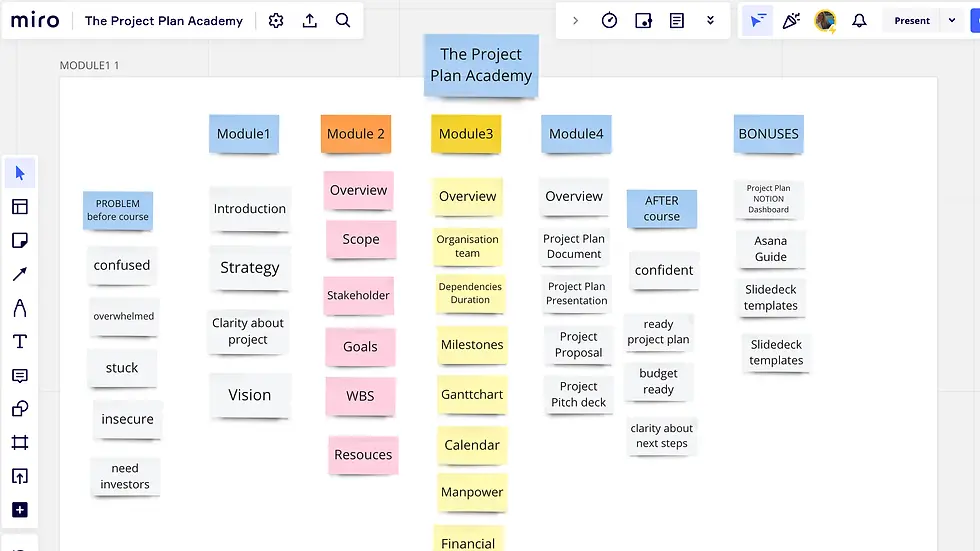A clear and organised project structure is essential for success in today's dynamic project management environment. A Work Breakdown Structure (WBS) is a fundamental tool that breaks projects into smaller, manageable components, ensuring clarity and efficiency. Miro, a versatile online collaborative whiteboard platform, provides an intuitive way to create and visualise WBS. This blog explores how to use Miro effectively for building a work breakdown structure with practical steps, tips, and examples.
1. What is a Work Breakdown Structure (WBS)?
A Work Breakdown Structure (WBS) is a hierarchical representation of the tasks and deliverables of a project. It breaks the project into smaller, more manageable parts, often visualised as a tree diagram or flowchart. WBS simplifies project planning by:
Defining the scope of work.
Assigning tasks to teams or individuals.
Providing a framework for estimating costs, resources, and timelines.
Ensuring alignment among stakeholders.
With Miro, teams can create a digital, visual WBS that fosters collaboration and real-time updates.
2. Why Use Miro for WBS?
Miro's powerful whiteboard features make it an excellent tool for creating WBS. Here are some key benefits:
Visual Collaboration: Teams can work together in real-time, regardless of location.
Customisation: Miro's drag-and-drop interface allows you to structure the WBS efficiently.
Templates: Pre-built WBS templates save time and provide a quick start.
Integration: Miro integrates with popular tools like Jira, Trello, and Asana to link tasks.
Scalability: Easily expand or adjust the WBS as project requirements evolve.
Miro empowers teams to organise complex projects visually, ensuring everyone remains on the same page.
3. Steps to Create a Work Breakdown Structure in Miro

Follow these steps to create a WBS in Miro:
Step 1: Set Up Your Miro Board
Log in to your Miro account and create a new board.
Use the search bar to locate a WBS template, or start with a blank board.
Name the board based on your project (e.g., "Website Redesign WBS").
Step 2: Define the Project Scope
Add the project name or primary deliverable using a sticky note or text box at the top level of the WBS.
Break the project into significant components or deliverables (Level 1). Use rectangles or sticky notes to represent each deliverable.
Example: For a website redesign project, Level 1 could include:
User Interface (UI) Design
Content Creation
Development
Testing and Deployment
Step 3: Break Down Deliverables into Tasks
Under each major component, decompose work into smaller, manageable tasks (Level 2 and beyond).
Use connectors or arrows to link tasks to their respective parent components.
Example: Under UI Design, tasks may include:
Wireframing
Design Mockups
User Feedback Review
Step 4: Organize with Colors and Tags
Use Miro's colour options to categorise tasks (e.g., different colours for teams or priorities).
Add tags or icons to indicate task owners, deadlines, or status.
Use frames to group components logically for a clean visual presentation.
Step 5: Add Details and Notes
Click on sticky notes or boxes to add descriptions, resources, or comments.
Attach links, files, or images to enrich the WBS (e.g., design documents, project plans).
Step 6: Collaborate with Your Team
Invite team members to the Miro board for real-time updates and input.
Use Miro’s comments feature to discuss specific tasks.
Hold WBS review sessions directly on the board using video conferencing tools integrated into Miro.
Step 7: Integrate with Project Management Tools
Link WBS tasks to tools like Jira, Asana, or Trello for seamless task tracking and execution.
Update the WBS dynamically as tasks are completed or revised.
4. Tips for Using Miro Effectively for WBS
To maximise Miro's capabilities, follow these tips:
Start with a Template: Use Miro’s WBS templates to save time and ensure consistency.
Keep it Simple: Avoid overcomplicating the WBS. Stick to the "100%"rule"—ensure all project work is accounted for without redundancy.
Use Collaboration Features: Encourage team members to contribute and provide real-time feedback.
Update Regularly: Maintain an updated WBS to reflect changes in project scope or timelines.
Leverage Visual Elements: Use icons, tags, and colors to make the WBS easy to understand at a glance.
5. Example: Building a WBS for a Marketing Campaign in Miro
Imagine you are managing a marketing campaign project. Here’s how your WBS might look in Miro:
Top-Level Deliverable: Marketing Campaign Launch
Content Creation
Blog Posts
Social Media Ads
Email Copy
Design
Graphics for Social Media
Ad Banners
Video Content
Execution
Scheduling Posts
Ad Deployment
Tracking Engagement
Testing and Reporting
A/B Testing
Analytics Report
Using Miro, you can visualise the tasks, assign team members, and add links to content drafts or analytics dashboards.
6. Benefits of Using Miro for WBS
Here’s why Miro is an ideal choice for WBS creation:
Improved Clarity: Visualizing tasks and deliverables makes it easier to understand project scope.
Enhanced Collaboration: Teams can co-create and update the WBS in real-time.
Scalability: Miro boards can grow as project complexity increases.
Integration: seamlessly connect WBS elements to project management tools.
Efficiency: Pre-built templates and drag-and-drop features streamline the process.
Statistic: According to Miro, 80% of Fortune 100 companies use Miro for collaboration and project management, demonstrating its effectiveness across industries.
7. Conclusion: Elevate Your WBS with Miro
A well-structured work breakdown structure is the foundation of successful project planning. With Miro, teams can visually organise tasks, collaborate in real-time, and integrate workflows seamlessly. Whether you're managing a software development project, marketing campaign, or product launch, Miro simplifies WBS creation, ensuring clarity and alignment among stakeholders.
Use Miro today to elevate your project management game and unite your team on a single visual platform.
Get Started with Miro Explore Miro’s templates, invite your team, and start building your WBS for the next big project!

.png)
Comentários